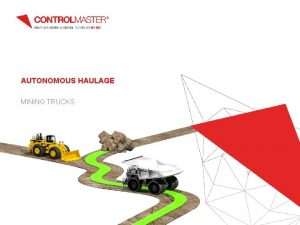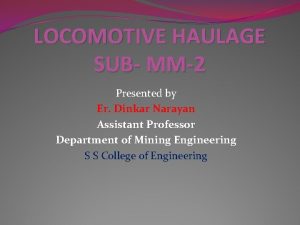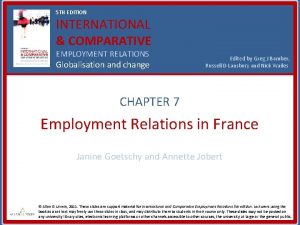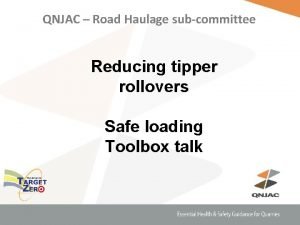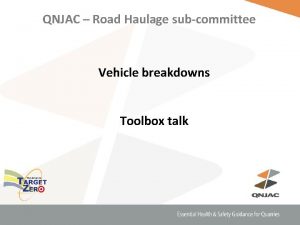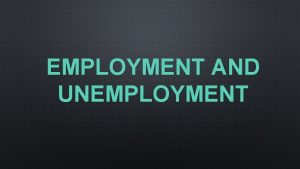Employment conditions in the international road haulage sector









- Slides: 9

Employment conditions in the international road haulage sector Main findings from a study provided to the European Parliament by IES in 2015 Andrea Broughton, Principal Research Fellow, IES 11 November 2015

Background and methodology § IES was commissioned in 2014 to provide the European Parliament with an analysis of employment conditions for drivers in international road haulage in the context of: • the growth of the EU internal market and its implications for social rights and employment conditions • the increasing integration of services in the EU and the growing number of drivers who work across borders • the opening up of the sector following EU enlargement in 2007 § The study aimed to identify challenges for future policy development and need for further research § Methodology: • Literature review • Interviews with experts and social partners

Overview of the sector § § § § The road haulage sector has undergone significant structural change over the past 10 years, due to market integration and increased competition The share of international transport operations increased from 30% of all road freight transport activities in 2004 to 33% in 2012 In particular, cabotage has grown by 50%, though its market share is still low, at 5% East-West divide: in terms of international flows, five of the top 10 Member States are from the EU 12 and half of all cabotage operations are performed by operators from the EU 12, up from a third in 2010. Employment in the sector has increased in most EU 12 countries but decreased in most EU 15 countries (exceptions are Germany and Sweden) The sector is male-dominated Almost 90% of drivers are employed on permanent contracts, although there are national differences. Over 95% of drivers are employed full-time

Employment conditions § Subcontracting is a prominent and increasing feature of the sector, often involving complex subcontracting chains across borders to benefit from hiring on the basis of lower wage levels. § This has been linked to employment practices that undermine the working conditions of drivers: false or bogus selfemployment and the employment of non-resident drivers via so-called letter box companies § Indications of some convergence of labour costs, although still considerable divergences between countries § The divergence in reported wages partly reflects different methods of remuneration: variable elements are a key component of total remuneration, particularly in the EU 12

Health and wellbeing § The main health and wellbeing risks are seen to be: • • Long driving times Insufficient rest Time spent away from appropriate facilities High strain, coupled with low autonomy § There is evidence that the employment conditions of EU 12 drivers are worse than those of EU 15 drivers in terms of pay, social protection, working time and rest breaks.

The result of market integration? § According to experts and stakeholders, in particular trade unions, there has been a negative impact of market integration on employment conditions. § There are indications that employment conditions have deteriorated, particularly in the areas of income, working hours, working environment and the accessibility and security of parking areas. However, robust evidence is limited. § Health and safety problems have been exacerbated by the increasing internationalisation of the sector, which results in longer missions and longer periods away from home. § There are indications that outflagging, the creation of letter box companies and bogus self-employment have increased over the past decade. § Has the road haulage sector become a laboratory for innovative employment practices bearing the risk of social dumping?

Is European legislation sufficient? § The EU legislative framework aims to balance market integration (access for operators and free movement) and protection of employees (eg regulation of working time and rest periods) § There are doubts as to whether this legislation is adequately protecting the employment conditions of drivers who work in an increasingly integrated, internationalised and competitive sector § Although current legislation is deemed to be adequate in general, there are issues around: • weak application and enforcement in Member States which may be partly due to a lack of clarity or loopholes in existing legislation • differences in interpretation of EU legislation, definitions and categorisation of infringements, levels of fines and sanctions • discrepancies in control mechanisms and enforcement practices. § The social partners are broadly in consensus about the key approaches to improving enforcement.

How to improve the situation § Review of existing legislation § Intensified coordination, including more EU guidance in the form of explanatory information, tools, financial help and exchange of good practice. § Infringements and penalties: Developing a common classification of infringements in order to standardise practice; assigning indicative values to sanctions in relation to minor, serious and very serious infringements in all areas of employment conditions. § Enforcement: Encouraging Member States to adequately staff labour inspection and to fund the training of enforcement officers; promoting cooperation between different national authorities. § Subcontracting and letter-box companies: Enhancing formal, written contracts to form the core of employment relationships in the sector, thus formalising supply chains; tightening conditions for access to the road haulage market.

If you want to know more… http: //www. europarl. europa. eu/Reg. Data/etudes/STUD/2015/542205/IPOL_STU(2015)542205_EN. pdf
